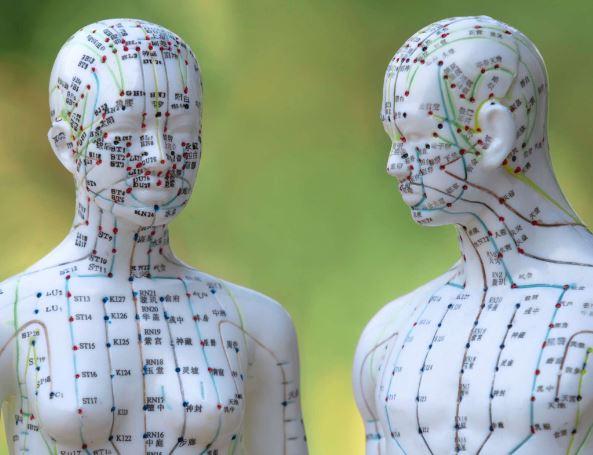Meridiane

🌿 What Are Meridians?
Meridians are invisible energy pathways in the body, originating from Traditional Chinese Medicine (TCM). They serve as channels through which life energy – known as Qi (Chi) – flows. Think of them as an energetic highway system that links the organs, emotions, and physical functions of the body.
🌀 The Basics of the Meridian System
-
Each person has 12 primary meridians and 8 extraordinary meridians.
-
The 12 primary meridians are each connected to a specific organ, like the lungs, liver, heart, stomach, etc.
-
They run symmetrically on both sides of the body.
-
Along the meridians lie the well-known acupuncture points, which can be stimulated for healing and energy balance.
🌿 The 12 Main Meridians
Each meridian is linked to either a Yin or Yang organ and has a peak time during the day when its energy is strongest:
| No. | Meridian Name | Associated Organ/Element | Yin / Yang | Peak Time |
|---|---|---|---|---|
| 1 | Lung Meridian | Metal | Yin | 03:00–05:00 |
| 2 | Large Intestine Meridian | Metal | Yang | 05:00–07:00 |
| 3 | Stomach Meridian | Earth | Yang | 07:00–09:00 |
| 4 | Spleen/Pancreas Meridian | Earth | Yin | 09:00–11:00 |
| 5 | Heart Meridian | Fire | Yin | 11:00–13:00 |
| 6 | Small Intestine Meridian | Fire | Yang | 13:00–15:00 |
| 7 | Bladder Meridian | Water | Yang | 15:00–17:00 |
| 8 | Kidney Meridian | Water | Yin | 17:00–19:00 |
| 9 | Pericardium Meridian | Fire (Circulation) | Yin | 19:00–21:00 |
| 10 | Triple Burner (San Jiao) Meridian | Fire (Functional) | Yang | 21:00–23:00 |
| 11 | Gallbladder Meridian | Wood | Yang | 23:00–01:00 |
| 12 | Liver Meridian | Wood | Yin | 01:00–03:00 |
🌌 The 8 Extraordinary Meridians
These meridians don’t follow the usual Yin/Yang organ pairing and are more like energy reservoirs or master regulators. They are used to store excess energy and manage deep, systemic processes.
| Meridian Name (English) | Function / Meaning |
|---|---|
| Du Mai (Governing Vessel) | Controls all Yang meridians – the "energetic spine" |
| Ren Mai (Conception Vessel) | Controls all Yin meridians – central Yin axis |
| Chong Mai (Penetrating Vessel) | Deep life-force channel; affects blood, reproduction, trauma |
| Dai Mai (Belt Vessel) | The only horizontal meridian – connects upper and lower body |
| Yin Qiao Mai (Yin Heel Vessel) | Controls Yin postures, movement, and sleep |
| Yang Qiao Mai (Yang Heel Vessel) | Controls Yang movements, activity, and wakefulness |
| Yin Wei Mai (Yin Linking Vessel) | Connects Yin meridians; relates to emotions and heart |
| Yang Wei Mai (Yang Linking Vessel) | Connects Yang meridians; harmonizes external responses |
⚠️ What Happens When Qi Is Blocked?
When Qi doesn’t flow freely — due to stress, trauma, poor diet, or emotional suppression — it can lead to physical, emotional, or energetic imbalances. Possible symptoms:
-
Fatigue
-
Pain (e.g., headaches, joint pain)
-
Digestive problems
-
Anxiety, mood swings
🧘♀️ How Are Meridians Used in Healing?
-
Acupuncture – Inserting fine needles into meridian points to balance Qi
-
Acupressure / Shiatsu – Stimulating points manually with fingers or tools
-
Qigong & Tai Chi – Movement practices to harmonize energy flow
-
Meridian Yoga – Poses and stretches that open specific meridian pathways
-
TCM Diagnostics – Pulse, tongue, and energy assessment to determine imbalances


